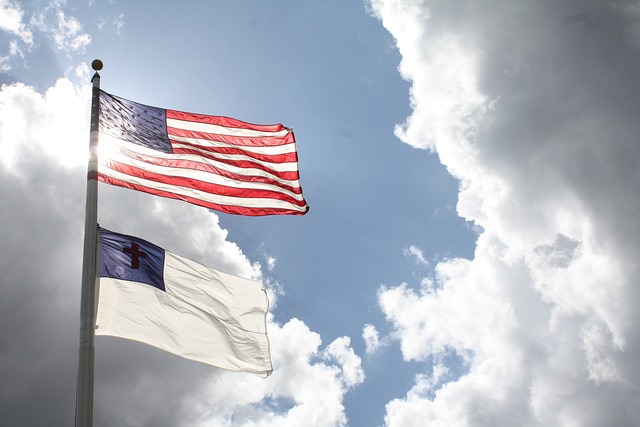
In a video for The Gospel Coalition—“Why America Is Not a Christian Nation”—Michael Horton said, “The misuse of Scripture for civil religion has plagued churches across the political spectrum for centuries. The problem isn’t new in our generation, but recent events remind us that Christians must speak clearly against the problematic concept of Christian Nationalism.” He was referring to the events of January 6, 2021. Horton referenced seeing a wooden cross “propped up outside the U.S. capitol, surrounded by a mob of people, hoisting up American flags” and not far from a platform and noose seemingly intended for the vice president. “The January 6th attack on the U.S. capitol, which included insurrectionists praying Christian prayers once they infiltrated the Senate chamber, has prompted a renewed conversation about what’s called ‘Christian Nationalism.’”
Horton is not the only Christian to raise concerns about this sense of Christian Nationalism. In “The Good, the Bad, and the Ugly of Christian Nationalism,” Patrick Schreiner said Christian Nationalism has become a junk box into which everyone piles their own conceptions of what they think it means. Some, like Michael Horton, equate it with rioting at the U.S. capitol. Others see it as attempting to enforce God’s law in our country, while still others see it as advocating for Christian moral values on issues like abortion. “How you view the movement depends almost entirely on your circles.”
Schreiner went on to unpack his understanding of three forms of Christian Nationalism as Good, Bad and Ugly. The good form of Christian Nationalism meant that “Christianity has influenced and should continue to influence the nation.” This sense of Christian Nationalism doesn’t attempt to dictate the political process or make the nation completely Christian by force, “but seeks instead to bring change by persuasion.” The adherents don’t force their opinions, but advocate their views by supporting laws, electing candidates, writing, podcasting, etc. In other words, they seek to make known God’s will providentially (Romans 1:19-20). “But this isn’t what most people mean by Christian Nationalism.”
Like theonomy, the bad form of Christian Nationalism wants a fusion of Christianity with American civil life, meaning the “laws of the United States should be explicitly Christian.” Instead of persuading by the word of our testimony (Revelation 12:11), adherents seek to enact and enforce laws. For them, the kingdom of God is brought about by command and power, not by the Spirit. Failed efforts of bringing about the kingdom of God by power exist throughout history. Christian conversion must occur by the compelling of the Spirit, not by instituting human law.
We conquer not by fighting the culture war but by embodying Jesus’s cross-shaped victory. His blood declares him the King of the universe, and our blood speaks to our solidarity with him. We continue to speak of and demonstrate Jesus’s cross in our own lives and so remain faithful in a pagan society.
While America does have a distinctly Christian past, the bad sense of Christian Nationalism overlooks key features of the American experiment, religious liberty and pluralism. The First Amendment says, “Congress shall make no law respecting an establishment of religion, or prohibiting the free exercise thereof.” Squashing dissent by law violates human liberty, and the vision of the founding fathers. It coerces those who dissent. In The Religion of American Greatness, Paul Miller said the First Amendment rightly protects religious freedom for all people, “including Muslims, atheists, and even progressives.”
If taken to its logical conclusion, this Nationalism undermines the foundation of a free society. Should such a fusion dominate American civil life, it would divide the nation rather than unify it. Uniformity in some aspects of national life isn’t all bad, but that must always exist beside diversity.
At this time in history, we live between Christ’s resurrection and his second coming. Making explicitly Christian laws perverts this distinction by our human attempts to institute Christ’s rule in the present age. In this age, religious freedom, diversity and pluralism are blessings to God’s people who want to live a peaceful and quiet life (1 Timothy 2:2). But we can’t codify or institute God’s law completely in this age. That is for Christ to do when he returns. “As citizens of the kingdom of God, we point forward to the [coming] kingdom but never forget the age we inhabit.”
Some will argue that nationality is a biblical idea, and point to the table of nations in Genesis 10, where God separates humanity into distinct groups. They will cite Deuteronomy 32:8, where it says when God gave the nations their inheritance, he divided mankind, “he fixed the borders of the peoples.” But they neglect Genesis 11, where mankind sought to build a city and tower with its top in the heavens to make a name for themselves, not God. When God saw what they had done, he confused their language and dispersed them over the face of the earth.
When Christian Nationalism turns ugly, it becomes a cultural framework that idealizes and advocates for the fusion of Christianity and American civil life and pursues it by dominion—by force or violence when necessary. It is a conflation of God and country—as Michael Horton said—into a civil religion. “The misuse of Scripture for civil religion has plagued churches across the political spectrum for centuries. The problem isn’t new in our generation, but recent events remind us that Christians must speak clearly against the problematic concept of Christian Nationalism.”
Although Christianity played a role in American history, America can never be honestly described as a Christian nation. “No nation-state can be a Christian nation-state, because Christianity doesn’t work that way.” Christianity and nation-states are two very different entities and to claim America is a Christian nation confuses the categories and forms a civil religion. However, there is nothing wrong with Christians getting involved with politics and political advocacy. It’s okay for Christians to participate in nonreligious and nonviolent protests of public policies.
But none of this should be confused with the Christian’s identity in the transnational family of God, and no national political agenda or ideal can take priority over God’s global mandate and mission for his people. . . . The worldwide church is Christ’s Kingdom.
In an article for Christianity Today, “What Is Christian Nationalism?”, Paul Miller explained how Christian Nationalism differed from other forms of nationalism, patriotism, and Christianity. Patriotism is the love of country, where nationalism is an argument about how to define a country. “All of God’s creation is good and patriotism helps us appreciate our particular place in it.” We should love our country and work to improve it by holding it up for critique and work for justice when it errs. Here, Miller seems to echo what Schreiner called “good” Christian Nationalism.
Nationalism begins with a belief that humanity is divisible into mutually distinct, internally coherent cultural groups. These groups are defined by shared traits like language, religion, ethnicity, or culture. Nationalists believe these groups should have their own governments. These governments should then promote and protect the nations’ cultural identity. And sovereign national groups should provide meaning and purpose for human beings.
Christian Nationalism is the belief that the American nation is defined by Christianity, “and that the government should take active steps to keep it that way.” Miller said this is not just an observation about American history, but an inflexible program for what America must do. They want the government to promote a specific cultural template for the country. This is a reflection of Schreiner’s “bad” Christian Nationalism.
Some have advocated for an amendment to the Constitution to recognize America’s Christian heritage, others to reinstitute prayer in public schools. Some work to enshrine a Christian nationalist interpretation of American history in school curricula, including that America has a special relationship with God or has been “chosen” by him to carry out a special mission on earth. Others advocate for immigration restrictions specifically to prevent a change to American religious and ethnic demographics or a change to American culture. Some want to empower the government to take stronger action to circumscribe immoral behavior.
Miller said this presumption that Christians are heirs of the true heritage of American culture tends to treat other Americans as second-class citizens. If implemented, it would not respect the full religious freedom of all Americans. Empowering the state through so-called “morals legislation” to regulate conduct carries the risk of overreaching “and creating governing powers that could be used later against Christianity.” Now we reach Schreiner’s “ugly” Christian Nationalism.
Additionally, Christian Nationalism is an ideology held overwhelmingly by white Americans, and it thus tends to exacerbate racial and ethnic cleavages. In recent years, the movement has grown increasingly characterized by fear and by a belief that Christians are victims of persecution. Some are beginning to argue that American Christians need to prepare to fight, physically, to preserve America’s identity, an argument that played into the January 6 riot.
Christian nationalism misappropriates the name of Christ for a worldly political power (nationalism), when Jesus said his kingdom is not of this world (John 18:36). It proclaims that its program is “the political program for every true believer.” In reality, it is a political ideology focused on the national identity of the United States. It includes a distorted understanding of American history and American government that is extrabiblical, while claiming to be biblical. While it generalizes from biblical ideas and principles, at its worst, it is contradictory to them.
In The Religion of America’s Greatness, Paul Miller said you can either be a Christian nationalist or a Christian; you can’t be both. Yes, Christians should be patriots, but true patriotism sometimes means rebuking our country for its sin, as we do when advocating for prolife. And it may mean working against it, as Dietrich Bonhoeffer did against the Nazi government of his German homeland. Perhaps so-called Christian nationalism is better referred to as religious nationalism.
We should not be trying to “Make America Great Again.” We should be striving to “seek first the kingdom of God and his righteousness” (Matthew 6:33). Christian Nationalism in the extreme is “a totalistic political religion that is inconsistent with orthodox Christianity, a false religion that places the nation in the place of the church and the leader in the place of God.”
We are called to be residents of the kingdom of God, which is not of this world.
For further reflections on nationalism, see the link “Christian Nationalism” on the website.





